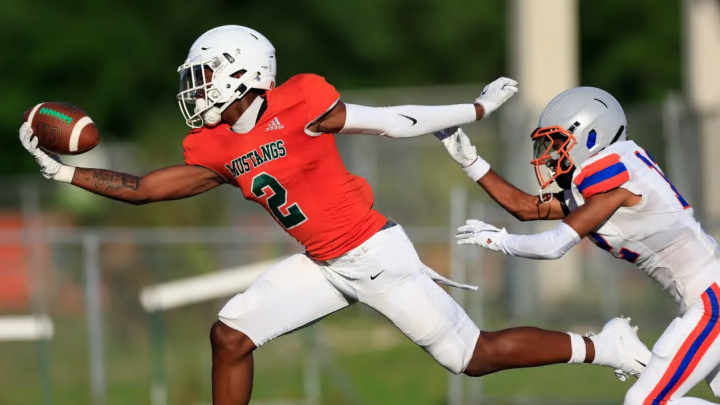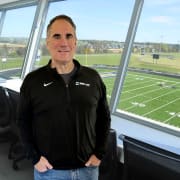Reactions to Florida’s new NIL policy for high school athletes reveal many concerns

GAINESVILLE, FLORIDA – Reactions have been pouring in since the Florida High School Athletic Association (FHSAA) board of directors voted unanimously, last week, to approve a policy which allows Florida high school athletes to join those from a growing list of states to profit from their Name, Image and Likeness (NIL).
Pending ratification by the Florida Department of Education (FLDOE), Florida will become the 36th state to adopt similar guidelines for high school athletes. Despite restrictions designed to limit abuse, some fear the new policy will trigger chaos in the Sunshine State.
According to many, Florida already has transfer issues. Unlike Georgia, its neighbor to the north, and most other states, Florida has open enrollment when it comes to academics and athletics. This has led to a spike in athletic transfers in recent years, especially among football players. The fear among some is that the lure of NIL opportunities could increase the transfer rate even more.
Sad day for the State of Florida!!!😔@TCHSCeltics @TCCelticsFB @FlaHSFootball @PayFLCoaches @FHSAA @FACACoach @Dwight_XOS @larryblustein pic.twitter.com/lxbHMGHImh
— John Brantley (@CoachBrantleyTC) June 4, 2024
“Our transfer rules are very open, therefore it will be used for ‘recruiting’ kids to schools,” said Pasco County School Board Athletic Director Matt Wicks said. “I think NIL will force the FHSAA to look at transfer rules and hopefully make things more stringent.”
When asked if there were enough safeguards built into the new NIL policy Matthew Dubuc, Assistant Athletic Director and Head Football Coach at Cardinal Gibbons High School was emphatic with his answer.
“Absolutely not,” said Dubuc, who has won two state championships at Gibbons. “Unfortunately this will expand a bigger level of divide between places with money and places that struggle to get money. It will probably separate locker-rooms and create more division in programs. Most coaches worry about covering their cost of running a program. The pay to play era will now be normal which makes it pro football.
“Kids will follow the money, a lot of empty promises will be made. Kids will follow the coach if he leaves a school. What we all have been taught or preached to over the years is now going to be worth money only. I hope the brain trust has a back up plan if this thing begins to spin out of control. Who will put a value on what someone is worth?”
Florida’s NIL policy comes with the following restrictions:
- Student-athletes and their parents are responsible for negotiating their own NIL deals. No agent of the school, such as a coach or booster, can take part in arranging a deal.
- The use of school logos, uniforms, team names, etc. in any NIL promotions is strictly prohibited.
- Student-athletes who transfer during a season are prohibited from securing NIL deals for that season, unless granted a special exemption.
- Schools and boosters cannot offer NIL deals as an inducement to recruit athletes away from other schools.
- Schools are prohibited from setting up college-style NIL collectives. Collectives are organizations created to raise funds to facilitate NIL deals for student-athletes.
Coaches who use NIL as a way of bringing players into their programs may get more than they bargained for according to Larry Blustein, the dean of Florida’s high school sports media.
“Head coaches could lose power to players with NIL deals,” said Blustein. “If they try and discipline a player, they will get their feelings hurt and leave.”
Another issue which has been a hot topic in Florida for several years is the compensation coaches receive, which is far below that of their colleagues in neighboring states. Some receive stipends as low as $3,500 for an entire season, a rate which will undoubtedly be surpassed by the NIL deals received by some of their players.
Although he does not disagree that some schools and coaches will exploit the NIL policy to recruit athletes, Manatee head football coach Jacquez Green, who starred at the University of Florida in the mid-nineties and was selected in the 1988 NFL Draft, feels the abuse will not be as wide-spread as some fear.
You are worth what someone is willing to pay you. https://t.co/Cx2KOytBKn
— 𝐃. 𝐉𝐚𝐜𝐪𝐮𝐞𝐳 𝐆𝐫𝐞𝐞𝐧 (@JacquezGreen) June 4, 2024
“If a person wants to pay a kid money to transfer, to win a high school football game, that’s on him or them. I would never,” Green said. “I don’t feel it will affect many players. I could be wrong. Only the one percent of elite high school kids will benefit from it.”
According to Dan LaForest, a licensed agent with Influencers Counsel, the NIL will not provide the same windfall to high school athletes as realized by those on the college level, but it may be bigger in Florida high school sports than other states.
“I think it could have a bigger impact than most people think,” LaForest said. “Keep in mind, not for everyone. There are many ways for players to profit but it won’t be as significant as it has been for college players.”
Per @fhsaa: #NIL has not been ratified by the Board of Education until July 24th meeting.
— Dan LaForest 🏈 (@DanLaForestFB) June 6, 2024
THEREFORE, you can not sign with an agent or sign an #NIL deal until it is complete.
It could be considered a violation and cost your eligibility.@TeamCounsel @Andy_Villamarzo… pic.twitter.com/g0TyhvpKqR
Within moments of last Tuesday’s announcement of the NIL policy approval by the FHSAA board, the South Florida Express, an elite 7-on7 football program, claimed in a tweet that two prominent Florida high school football players, both members of its program, became the first to ink NIL deals.
Mandarin’s Jaime Ffrench Jr. and Orlando Jones’ Vernell Brown, a pair of nationally-ranked wide receivers, were said to have signed NIL deals with clothing company American Eagle. The tweet, which has since been removed, was initially reposted by each player’s personal X (formerly Twitter) account.
One possible reason for the removal of the tweet is the fact that the deals are premature, pending the final ratification by the FLDOE, which is not scheduled to meet again until July 24. For its part American Eagle, in an email to the Tampa Bay Times, denied entering into NIL arrangements with the players.
It is not likely that Ffrench or Jones will face any ramifications from the premature announcement, especially if the FLDOE does indeed ratify the new policy, but FHSAA spokesperson Ryan Harrison did indicate to the Times that an investigation by the FHSAA’s eligibility and compliance department could take place if an official allegation is presented.
Despite potential abuses and the complications that may arise, NIL in Florida always seemed to be inevitable. The FHSAA just hopes to limit the problems.
“It’s not pay-for-performance, per se. But I think we’re trying to avoid what’s happened on the collegiate side," FHSAA board member Sara Bayliss, a college counselor at St. John Paul II Catholic in Tallahassee, told the Florida Times Union. “I don’t think it will be used widely, but our student-athletes should be compensated as long as it falls between the lines and doesn’t become a recruiting problem. If it does, we’ll deal with it.”
Prior to last week, Florida was one of just 20 states that had not yet approved a NIL policy for its student-athletes. Alabama, Kentucky, Mississippi and South Carolina are other notable Southeastern states that have yet to approve a NIL policy.
-- Andy Villamarzo | villamarzo@scorebooklive.com | @sblivefl

